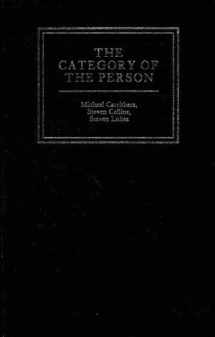
The Category of the Person: Anthropology, Philosophy, History
ISBN-13:
9780521259095
ISBN-10:
0521259096
Author:
Steven Lukes, Michael Carrithers, Steven Collins
Publication date:
1985
Publisher:
Cambridge University Press
Format:
Hardcover
319 pages
Category:
General
,
Psychology
FREE US shipping
Book details
ISBN-13:
9780521259095
ISBN-10:
0521259096
Author:
Steven Lukes, Michael Carrithers, Steven Collins
Publication date:
1985
Publisher:
Cambridge University Press
Format:
Hardcover
319 pages
Category:
General
,
Psychology
Summary
The Category of the Person: Anthropology, Philosophy, History (ISBN-13: 9780521259095 and ISBN-10: 0521259096), written by authors
Steven Lukes, Michael Carrithers, Steven Collins, was published by Cambridge University Press in 1985.
With an overall rating of 4.0 stars, it's a notable title among other
General
(Psychology) books. You can easily purchase or rent The Category of the Person: Anthropology, Philosophy, History (Hardcover) from BooksRun,
along with many other new and used
General
books
and textbooks.
And, if you're looking to sell your copy, our current buyback offer is $0.54.
Description
The concept that people have of themselves as a 'person' is one of the most intimate notions that they hold. Yet the way in which the category of the person is conceived varies over time and space. In this volume, anthropologists, philosophers, and historians examine the notion of the person in different cultures, past and present. Taking as their starting point a lecture on the person as a category of the human mind, given by Marcel Mauss in 1938, the contributors critically assess Mauss's speculation that notions of the person, rather than being primarily philosophical or psychological, have a complex social and ideological origin. Discussing societies ranging from ancient Greece, India, and China to modern Africa and Papua New Guinea, they provide fascinating descriptions of how these different cultures define the person. But they also raise deeper theoretical issues: What is universally constant and what is culturally variable in people's thinking about the person? How can these variations be explained? Has there been a general progressive development toward the modern Western view of the person? What is distinctive about this? How do one's notions of the person inform one's ability to comprehend alternative formulations? These questions are of compelling interest for a wide range of anthropologists, philosophers, historians, psychologists, sociologists, orientalists, and classicists. The book will appeal to any reader concerned with understanding one of the most fundamental aspects of human existence.


We would LOVE it if you could help us and other readers by reviewing the book
Book review

Congratulations! We have received your book review.
{user}
{createdAt}
by {truncated_author}


